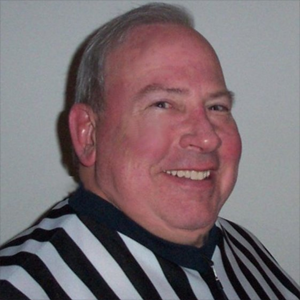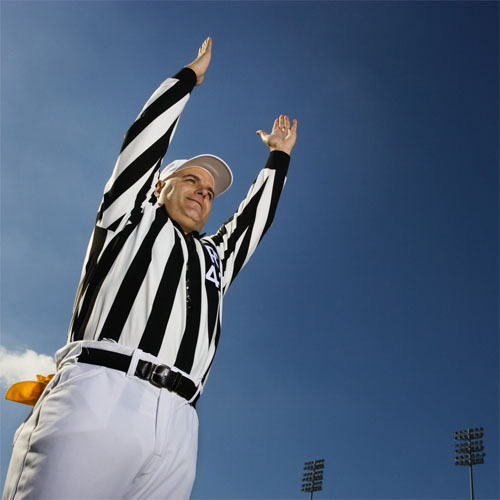
Rndballref
20 Years Experience
Chicago, IL
Male, 60
For twenty years I officiated high school, AAU and park district basketball games, retiring recently. For a few officiating is the focus of their occupation, while for most working as an umpire or basketball referee is an avocation. I started ref'ing to earn beer money during college, but it became a great way to stay connected to the best sports game in the universe. As a spinoff, I wrote a sports-thriller novel loosely based on my referee experiences titled, Advantage Disadvantage
Yes. A sub can be brought in on any dead ball when the clock is stopped. The only exception is if there is to be another free throw after this one subs are to wait until the next to last free throw before being waved in.
Time stops when an offical: signals a foul, held ball or violation, stops play for an injury or score inquiry, grants a time out, or responds to the scorer signal. SO, unless the referees stopped play with their whistle PLAY ON and the basket should count. That is why players are coached to stop on the whistle, not the buzzer.
If the officials did stop play when they heard the buzzer, it sounds like a foul should have been called. Either way, as you desribe it officiating mistakes were made.
There are 5 correctible errors in the rule book and failing to remove a player with 5 fouls is NOT one of them. The free throw stands and the ref has egg on his face for rushing and not making sure his partner was ready. But it is not correctible.
This is an unusual play with the foul on defensive player A being called. Normally, a second foul could is ignored as long as it is unintentional because the first foul made the ball dead. If the offensive player is on the ground and fouled, then steps into a charge the charge would be ignored.
But here is an interesting twist. What if Offensive player B is an airborne shooter fouled in the act of shooting by defender A but plows into defender B before touching the floor. The ball is not dead when an airborne shooter is fouled until they hit the floor so technically this could be called a simultaneous foul and go to the possession arrow. In practice, most officials will call the foul on defender A and ignore the subsequent player control foul (charge).
Football Official
 Do you think it's ok for NFL refs to play fantasy football?
Do you think it's ok for NFL refs to play fantasy football?
Fashion Model
 How much do promo girls at convention booths get paid?
How much do promo girls at convention booths get paid?
CPR Trainer
 Are men better at CPR than women because they're generally stronger?
Are men better at CPR than women because they're generally stronger?
No this move is not legal because even though the offensive player has the right to the vertical space once he has attained a legal position on the floor, he cannot initiate contact by slapping the opponents arm.
The defensive player can penetrate that vertical space but cannot make contact in that space. So, a defender can reach into the vertical space of the offensive player to try to steal the ball as long as there is no contact. But if the defender reaches into the vertical space and initiates contact it is a defensive foul.
But what if the offensive player initiates contact inside his legally obtained space? If for example, the offensive player jumps vertically and crashes into the defender - foul on the defender.
But what if the offensive player slaps the defender's hand? The offensive player caused the contact, and most likely it occurred outside the offensiive player's vertical space, so it is a foul on the offensive player for initiating contact.
I know that many coaches teach the dribbler to put up a bent arm as a barrier to the defender but when the dribbler initiates contact by pushing or slapping the defender it is a player control foul on the dribbler. Most often, the dribbler is NOT entitled to the space where the defender is reaching in. In my opinion, this is not called enough.
By the way, there is no defintion in the rule book of "reaching in". If reaching in was illegal, you could never steal the ball from a dribbler.
A player who establishes valid court position has the air rights vertically. In practice, if an offensive player clips his knee on the defenders chest, it normally will not be called.
Let me preface my answer by reminding you that I am an advocate of the Advantage Disadvantage philosophy of officiating basketball. This philosophy advocates not stopping play to call a foul or a violation unless that action causes a change in the balance of the defense/offense posture.
So, I tended to call very few 3 seconds in varsity basketball. For me it was usually a late call, as in a player is camped in the lane and gets the rebound, I would call a late 3 seconds call. If he didn't get the rebound play on. But since play goes so fast, premptive officiating would suggest warning the player to get out of the lane before having to make an advantage/disadvantage decision.
This is controversial in 2 ways: 1) you are right that at the varsity level players should not be "coached" by the ref's, and 2) not everyone believes in advantage/disadvantage.
I would warn a player once to stop him from camping out in there, but I am an advocate of advantage disadvantage officiating.
-OR-
 Login with Facebook
Login with Facebook (max 20 characters - letters, numbers, and underscores only. Note that your username is private, and you have the option to choose an alias when asking questions or hosting a Q&A.)
(A valid e-mail address is required. Your e-mail will not be shared with anyone.)
(min 5 characters)
By checking this box, you acknowledge that you have read and agree to Jobstr.com’s Terms and Privacy Policy.
-OR-
 Register with Facebook
Register with Facebook(Don't worry: you'll be able to choose an alias when asking questions or hosting a Q&A.)